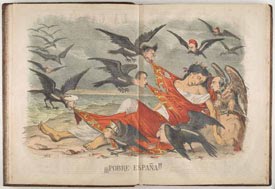
Every month, RBMSCL staff members turn the pages of the four volume double elephant folio set of John James Audubon’s Birds of America. This keeps the rare volumes from developing “preferential openings”—tendencies to open to one particular page that often result when books are on display for long periods of time.
Duke Law student Amanda Pooler, making her first visit to the Rare Book Room, helped select the new openings. She chose the Brown Pelican (Pelicanus Fuscus), the state bird of her native Louisiana, as well as the Raven (Corvus Corax); the Carolina Parrot (Psittacus Carolinensis); and the Kittiwake Gull (Larus Tridactylus).
Stop by the RBMSCL reading room (103 Perkins) during open hours to view these gorgeous prints.
Thanks to Beth Doyle, Collections Conservator, for helping with this post. Check out Beth’s own post on the Audubons over at Preservation Underground.










